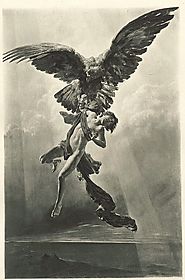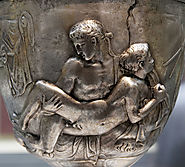-
About
- About Listly
- Community & Support
- Howto
- Chrome Extension
- Bookmarklet
- WordPress Plugin
- Listly Premium
- Privacy
- Terms
- DMCA Copyright
- © 2010-2025 Boomy Labs

 dakota-duncan
dakota-duncan
Listly by dakota-duncan
This Listly is a compilation of media that explores how early modern people in England would have perceived the term "Ganymede" as it appears in Shakespeare's comedy, As You Like It.

This wood-cut image from 1892 represents the sense of "ganymedes," beautiful young men or boys, as victims of sexual violence, or at least coercion, as passive partners in sexual intercourse with older men (OED definition 1.a). The image depicts Zeus in the form of an eagle forcing himself on Ganymede against his will, as he does in some versions of the Ganymede myth.

This image is a picture of the Warren Cup, a classical Roman artifact uncovered near Jerusalem in the 20th century and now displayed in the British Museum. The cup depicts male-male sexual acts, often with "catamites," or young male prostitutes. In Shakespeare's day, "ganymede" was sometimes used synonymously with "catamite," in which sense it was a heavily pejorative term with reference to very adult men who had 'kept' boys or young men as prostitutes (OED). The term Catamite, incidentally, comes from "Catamitus," the Latin name for Ganymede in their parallel myth with Jupiter, the Roman version of Zeus. While in many early modern uses the term "ganymede" or "catamite" betrays a just sense of disdain for older men who committed such acts, whether depicted in Roman times, as on the Warren Cup, or in modern times in certain courts throughout the world, it is likely much of the disgust for those who 'kept' these "catamites" or Ganymedes was probably more related to early modern England's general disapproval of homosexual acts.

We know from the Oxford English Dictionary that Shakespeare's contemporaries were well aware of the Greek myth of Zeus and Ganymede (OED "Ganymede" definition 1), in which Zeus takes the youth Ganymede (willingly, or, in some versions, unwillingly) to be his cup bearer, and likely his lover, among the gods. Indeed, Shakespeare's use of Greek mythology in As You Like It implies a cultural familiarity with it (4.1.89-99), at least among the educated. This Cretan version of the myth has a more positive connotation about it, but early modern English people often had darker understandings of the myth and the term "Ganymede."

But since she pricked thee out for women's pleasure, Mine be thy love and thy love’s use their treasure.
This is a rendition Shakespeare's "Sonnet 20" by bisexual singer-songwriter Rufus Wainwright. Wainwright's adaptation is an expression of unrequited love for a straight man. While we don't know Shakespeare's intent in writing this poem, reactions of disgust to it are well documented. In her lengthy exploration on the subject entitled "Homoerotic Desire and Renaissance Lyric Verse," Rebecca Yearling argues that Shakespeare and other poets who used the lyric voice in conjunction with homoeroticism made many men who read them feel personal accosted by homosexual passions due to lyric verse's intimate nature. The object of the speaker's adoration in "Sonnet 20" is clearly a "Ganymede" in the sense of a beautiful or handsome young man with soft features (OED 1).

"Oh would shee would forsake my Ganimede,
Whose sugred love is full of sweete delight,
Upon whose forehead you may plainely reade
Loves pleasure grav'd in yvorie tables bright:
In whose faire eye-balls you may clearely see
Base Love still staind with foule indignitie.
Oh would to God he would but pitty mee,
That love him more than any mortall wight!
Then he and I with love would soone agree,
That now cannot abide his sutors sight.
O would to God, so I might have my fee,
My lips were honey, and thy mouth a bee!"
In his poem "Affectionate Shepherd," Richard Barnfield also made plenty of controversial buzz by having his speaker address same-sex sentiments to a young man or youth, whom he unambiguously calls his "Ganymede." According to Rebecca Yearling's "Homoerotic Desire and Renaissance Lyric Verse," Barnfield later attempted to excuse his actions by stating he was merely imitating the Roman poet Virgil, a respectable academic discipline. Barnfield's use of "Ganymede" suggests how the mythical figure and term was used by Shakespeare and his contemporaries in early modern England, and the public reaction to this further affirms a cultural disgust for homosexual sentiments and censure against writers who weren't careful enough about invoking them.

While commentaries on the use of "Ganymede" in Early Modern English can be hard to find, the OED contains disturbing contexts for the word's use that still resonate today, dripping with homophobia. One entry in the OED from 1694, about a century after Shakespeare, makes general homophobic use of the word in conjunction with synonymous terms like "he-whores" and "Sodomites," referring to the story in Genesis 19:4-7, wherein the men of Sodom want to rape angels who have come to visit Lot and his family because the angels are so beautiful and effeminate in appearance.
In this contemporary tweet by conservative incendiary and Breitbart contributor Kurt Schlichther, he scorns conservatives who 'blinked' in Justice Kavanaugh's confirmation process by pausing to have a hearing about allegations of sexual assault and rape against him. Schlichter implies that these men are "catamites" and by extension, "Ganymedes," in the worst sense of the word: effeminate, unmanly, and willing to 'bend over' for what he calls a liberal sham. To make matters worse, comments on this Reddit thread said things like: "Bitch Ass....A rather apt term I think." and "Cancer took [John McCain]. [Jeff] Flake is next."
This contemporary use of the term is sadly identical to the way most people used it many centuries ago. Shakespeare's use of "Ganymede" as heroine Rosalind's male identity may, therefore, imply opposition to the ugliness he saw in his day that we see in our own.

Upon looking up "Ganymede" and "catamite" in the OED, I was immediately reminded of the nuance present in one of two miracles Jesus performed for Gentiles in the gospels. The traditional translation goes that a Roman military officer approaches Jesus and asks for the healing of his "boy/son" or "servant," who is very sick at home. Recent applications of queer theory have cast doubt on these original translations. In his exploration of this pericope, "The Historical Jesus and the Slave of the Centurion: How the Themes of Slavery, Sexuality, and Military Service Intersect in Matthew 8:5-13," Eric Koepnick states that the word pais, which presumably would have been familiar to educated early modern English people who likely would have learned Greek and read Greek classics, can be interpreted as "servant" or "boy son" as previous translations have put it. It can also mean "slave," "handsome young man," and "beloved." Koepnick raises the possibility that the term pais could very well refer to the Centurion's youth lover, as discussed in other list items. The Centurion's passion in coming to Jesus directly to plead for the youth's healing and Jesus's favorable response that the Centurion "has more faith" than any Israelite could imply a truly radical action on Jesus's part in conferring a blessing on a homosexual relationship. It makes Jesus's statement that "there are many who will come from east and west and sit down to eat with Abraham and Isaac and Jacob in the kingdom of heaven" even more significant.
If Shakespeare and his contemporaries were aware of this subtle possibility, it may have been something which was either deeply troubling to them or a great revelation. Regardless, the potential exchange of "pais" for "Ganymede" is a fascinating potential translation with significant theological and cultural consequences.

In "Performing Pedagogy in Early Modern England: Gender, Instruction, and Performance," a book by Kathryn M. Moncrief, she discusses the Greco-Roman practice of pederasty, which was and is a pedagogical paradigm in many cultural contexts. The practice involves a young man spending a lot of intimate time with an older man in a relationship that was, at least sometimes, sexual. The practice of pederasty closely parallels the myth of Zeus and Ganymede, and its controversy in early modern England is certainly part of the context of As You Like It.
Christopher Marlowe, who shortly preceded Shakespeare's fame, wrote a short and highly contested play entitled Dido in which Marlowe very consciously wades into the Ganymede-pederasty debacle, guns blazing. The play is, in Moncrief's words "transgressive" and "brazen" in that it makes a same-sex relationship explicitly sexual and implies such a union could rival and outlast heterosexual marriages. There is so much to unpack about this "Ganymede" concept!

In this image from the 2009 Globe production of As You Like It, Rosalind and Orlando kiss with Rosalind still dressed as a man. As a character, Rosalind cross-dressing and calling herself Ganymede implies much about the concept of "Ganymede" in early modern England. The implication of such gender-bending is two-fold; first, that a man can be effeminate and adored as "Ganymede" is adored by Orlando (4.1.62-66) and Phoebe (3.5.81-82). Second, that a woman can be heroic in the way Rosalind is heroic and courageous in confronting her evil uncle (1.3.55-60).
Through Rosalind and "Ganymede," Shakespeare may have been addressing early modern anxieties about masculinity and criticizing a male-dominated society. In his book, "Anxious Masculinity in Early Modern England," Mark Breitenberg notes that "patriarchal culture -- infused with patriarchal assumptions about power, privilege, sexual desire, and the body -- inevitably engenders varying degrees of anxiety in its male members." Perhaps this is why there's a lot of fuss in Early Modern English literature and culture about the myth of Zeus and Ganymede, which challenged traditional understandings of sexuality and gender. Perhaps this also explains the pervasive homophobia in our contemporary society, and homophobia in Early Modern reactions to various literature.

The Amazon-BBC miniseries A Very English Scandal (2018) is based in the factual real-life drama of Jeremy Thorpe, a prominent figure in Britain's Liberal Party, and the events leading to his 1979 trial for the attempted murder of his ex-lover Norman Scott. Thorpe was found innocent by a jury that dismissed Scott as another trashy example of that oft-hated "Ganymede" and "catamite" trope, but public reaction to the trial invigorated the LGBTQ rights movement in Great Britain. The power dynamic of this relatively contemporary story in which a prominent member of the landed gentry was ultimately shamed for his sexual relationship with a stable boy is eerily similar to one of the few sodomy trials recorded in early modern England, which occurred in 1631. As detailed by Sarah Carter in " ‘That female wanton boy’: Ganymede, Iphis, and Myths of Same Sex Desire," the trial centered around a gentleman who was likely tried only because he had stooped beneath his station in his sexual indiscretions and wasted a fortune on his male lovers.
So how does this intersect with our discussion of the term and character of "Ganymede" in this time period? It implies what was potentially the most threatening about this bubbling milieu of emerging sexual and gender deviance was its feared destruction of traditional English propriety, which at the time ranged from primogeniture to the very concept of nobility itself. In implying that women are noble creatures capable of traditional 'manly' heroism, that men need not be narrowly defined, and that primogeniture is an arbitrary method of succession, Shakespeare was rocking the boat in a big way, and we absolutely love him for it.
Given the fact that same-sex acts were not fully decriminalized throughout the UK until 1982, and not fully decriminalized in the US until 2003, the boat-rocking begun by Rosalind and "Ganymede" in As You Like It and by Marlowe and other like-minded contemporaries centuries ago is still incredibly relevant to the Anglophone world today.
